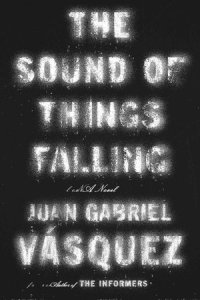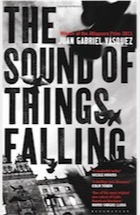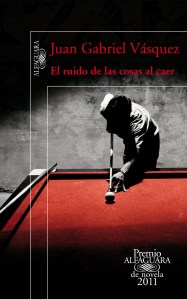This recommendation comes from José Ignacio, who blogs at The Game’s Afoot.
Reseña: El Ruido de las Cosas al Caer (English: The Sound of Things Falling) de Juan Gabriel Vásquez
This post is bilingual, scroll down to find the English language version
Esta entrada es mi aportación para honrar la memoria de Maxine Clarke. Ustdes pueden leer más sobre esto aquí y en el blog Petrona Remembered.
Alfaguara, 2011. Kindle edition (2422 KB). ASIN: B00634NZUE. E-ISBN: 978-84-204-9494-4. Pages: 272.
El ruido de las cosas al caer fue galardonado con el XIV Premio Alfaguara de Novela 2011. En en el acta del Premio “El jurado quiere destacar las cualidades estilísticas de esta novela cuya prosa recrea una atmósfera original y atractiva, un espacio propio habitado por personajes que acompañarán al lector. Ambientada en la Colombia contemporánea, la trama narra el viaje de un hombre que busca en el pasado una explicación de us situación y la de su país. Una lectura conmovedora sobre el amor y la superación del miedo.”
La traducción inglesa de Anne McLean, publicada en 2013, ganó el Premio Internacional de Literatura IMPAC Dublin en el 2014. En el comentario de los jueces se indica que: “El Ruido de las Cosas al Caer es un destacado thriller literario que resuena mucho después de la última página. Por medio de un dominio magistral de capas de tiempo superpuestas, misterios crecientes y una paleta noir, nos revela cómo la vida íntima se ve ensombrecida por la historia; cómo el pasado se alimenta del presente; y cómo el destino de los individuos, así como el de los países es moldeado por los acontecimientos lejanos, o encubiertos “. (Mi traducción libre, la cita completa en inglés está disponible aquí).
También ha estado galardonado con el Premio Gregor von Rezzori-Città di Firenze 2013. En la motivación del jurado se indica: “La nueva novela de Vásquez, El ruido de las cosas al caer, es una historia de conspiraciones y asesinatos, de personas que se enfrentan a misterios que, si se solucionan, podrían ayudarles a reparar sus vidas destrozadas. Es el noir, elevado a la categoría de arte. Es una novela que engancha desde la primera página, pero también nos ofrece una meditación profunda sobre el destino y la mortalidad.” (Mi traducción libre, la cita en inglés esta disponible aquí)
La historia está narrada en primera persona por el protagonista, un joven profesor de Derecho de la Universidad de Bogotá (Colombia), llamado Antonio Yammara. La acción se se pone en marcha a partir de la lectura de una noticia en una revista importante a mediados de 2009: Un hipopótamo macho cayó muerto. Había escapado dos años atrás del antiguo zoológico de Pablo Escobar en el valle del Magdalena, y en ese tiempo de libertad había destruido cultivos, invadido abrevaderos. atemorizado a los pescadores y llegado a atacar a los sementales de una hacienda ganadera. Los francotiradores que lo alcanzaron le dispararon un tiro en la cabeza y otro al corazón….
A partir de ese momento, el recuerdo de Ricardo Laverde se convertirá en un fantasma siempre presente, fiel y dedicado. Y Antonio va a pensar cada vez más acerca de los días en que se conocieron, sobre la brevedad de su relación y la longevidad de sus consecuencias. Poco a poco iremos descubriendo que Ricardo Laverde murió, o más precisamente, lo mataron a principios de 1996, Antonio lo había conocido a finales del año pasado, unas semanas antes de Navidad, cuando estaba a punto de cumplir veintiséis años. Hace dos años que se había graduado de la Facultad de Derecho y se había convertido en el profesor más joven en dar clases en la facultad. Después del trabajo, él solía aparecer en los billares de la calle 14, cerca del apartamento donde vivía. Por esos días Bogotá comenzaba a desprenderse de los años más violentos de su historia reciente.
Las primeras palabras de Ricardo Laverde, que Antonio escuchó fueron: “Qué culpa tienen ellos de nada”. En referencia a la situación de los animales abandonados en la Hacienda Nápoles, el lugar mitológico de Pablo Escobar, después de su muerte en 1993. Días más tarde, después de que Laverde se hubiera marchado, uno de los muchachos con los que Antonio había estado jugando, le reveló que Ricardo acababa de salir de la cárcel donde había pasado veinte años. Pero nadie sabía realmente cuál fue su delito. Y así, casi sin darse cuenta, Ricardo y Antonio se fueron acercando.
Espero que me permitan terminar aquí esta breve introducción. Aunque, tal vez, debo añadir que un día, al salir de los billares, Ricardo es asesinado y Antonio resulta gravemente herido. Lo que sigue es el viaje que Antonio emprende con el fin de descubrir el pasado de Ricardo y comprender su propio presente.
Juan Gabriel Vásquez (Bogotá, 1973) es autor de la colección de relatos Los Amantes de Todos los Santos y de las novelas Los Informantes (escogida por la revista Semana como una de las más importantes publicadas en Colombia desde 1982), Historia Secreta de Costaguana (Premio Qwerty en Barcelona y Premio Fundación Libros & Letras en Bogotá) y El Ruido de las Cosas al Caer (Premio Alfaguara 2011, English Pen Award 2012 y Premio Gregor von Rezzori- Città di Firenze 2013 y Premio IMPAC Dublín). Vásquez ha publicado también una recopilación de ensayos literarios, El arte de la distorsión, y una breve biografía de Joseph Conrad, El Hombre de Ninguna Parte. Ha traducido obras de John Hersey, John Dos Passos, Victor Hugo y E. M. Forster, entre otros, y es columnista del periódico colombiano El Espectador. Sus libros han recibido diversos reconocimientos internacionales y se han publicado en dieciséis lenguas y una treintena de países con extraordinario éxito de crítica y de público. Ha ganado dos veces el Premio Nacional de Periodismo Simón Bolívar. En el año 2012 ganó en París el Premio Roger Caillois por el conjunto de su obra, otorgado anteriormente a escritores como Mario Vargas Llosa, Carlos Fuentes, Ricardo Piglia y Roberto Bolaño. Las reputaciones es su cuarta novela. Aquí puedes escuchar el discurso de Juan Gabriel Vásquez al recibir el Premio IMPAC Dublín 2014. (Información de Anagrama).
El Ruido de las Cosas al Caer es una novela brillante que encaja mejor en el neo-noir sudamericano que en la categoría de novela de detectives. Tengo que admitir que me ha gustado mucho. De alguna manera nos acerca a una realidad bastante familiar para aquellos de nosotros que vivimos en ese momento, pero que, al mismo tiempo, era una realidad muy desconocida. No es una mera descripción documental de algunos acontecimientos históricos, pero, en mi opinión, es una importante obra de ficción contemporánea, magistralmente escrita, y con un uso muy interesante y eficiente de los diferentes períodos de tiempo en los que se desarrolla la novela. Una trama que tiene lugar en un país muy específico y en un período de tiempo muy concreto. Lo recomiendo encarecidamente.
Mi valoración: A+ (No se demore, consiga un ejemplar de este libro) Alfaguara
The Sound of Things Falling by Juan Gabriel Vásquez
 This post is my contribution to honour the memory of Maxine Clarke. You can read more about this here and on the blog Petrona Remembered.
This post is my contribution to honour the memory of Maxine Clarke. You can read more about this here and on the blog Petrona Remembered.
The sound of things falling was awarded the XIV Premio Alfaguara de Novela 2011. In their motivation “The jury wants to highlight the stylistic qualities of this novel whose prose recreates an original and attractive atmosphere, its own space inhabited by characters that will accompany the reader. Set in contemporary Colombia, the plot follows the journey of a man who searches in the past an explanation of his situation and of his country. A touching read about love and overcoming fear.” (My free translation)
An English translation by Anne McLean was released in 2013 and won the 2014 International IMPAC Dublin Literary Award. The judges commented: “The Sound of Things Falling is a consummate literary thriller that resonates long after the final page. Through a masterly command of layered time periods, spiralling mysteries and a noir palette, it reveals how intimate lives are overshadowed by history; how the past preys on the present; and how the fate of individuals as well as countries is moulded by distant, or covert, events.” (read full citation)
It has also been the recipient of the Premio Gregor von Rezzori-Città di Firenze 2013. In their motivation the jury stated: “Vásquez’s new novel, The Sound of Things Falling, is a story of conspiracies and assassinations, of people confronting mysteries that, if solved, might help them repair their shattered lives. It’s noir, raised to the level of art. It’s a page-turner, but it’s also a profound meditation on fate and mortality.” (here)
The story is told in first person by the main character, a young law professor at the  University of Bogotá (Colombia), called Antonio Yammara. The action begins while he’s reading a story in a major magazine in the middle of 2009: A male hippopotamus was shot dead. He’d escaped two years before from Pablo Escobar’s old zoo in the Magdalena Valley, and during that time of freedom had destroyed crops, invaded drinking troughs, terrified fishermen and even attacked the breeding bulls at a cattle ranch. The marksmen who caught up with him shot him once in the head and again in the heart….
University of Bogotá (Colombia), called Antonio Yammara. The action begins while he’s reading a story in a major magazine in the middle of 2009: A male hippopotamus was shot dead. He’d escaped two years before from Pablo Escobar’s old zoo in the Magdalena Valley, and during that time of freedom had destroyed crops, invaded drinking troughs, terrified fishermen and even attacked the breeding bulls at a cattle ranch. The marksmen who caught up with him shot him once in the head and again in the heart….
From that moment, the memory of Ricardo Laverde will become an ever-present ghost, faithful and devoted. And Antonio will increasingly think about the days when they met each other, about the brevity of their relationship and the longevity of its consequences. Gradually we will discover that Ricardo Laverde died, or more precisely, he was killed in early 1996. Antonio had met him late last year, a few weeks before Christmas, when he was about to turn twenty-six. Two years ago he had graduated from Law School and had turned into the youngest lecturer ever to teach in the faculty. After work, he used to show up at the billiard club on 14th Street, near the apartment where he lived. At the time Bogotá was beginning to emerge from the most violent years of its recent history.
The first words from Ricardo Laverde, that Antonio heard were: ‘It’s not their fault, anyway’, referring to the situation of the abandoned animals at Hacienda Napoles, the mythological place of Pablo Escobar, after his death in 1993. Some days later, after Laverde had gone, one of the guys with whom Antonio had been playing, revealed him that Ricardo had just come out of prison where he had spent twenty years. But no one really knew what was his crime. And thus, almost without realising it, Ricardo and Antonio began to approach each other.
I hope you will allow me to finish here this brief introduction. Although, perhaps, I should add that one day, upon leaving the billiard club, Ricardo is murdered and Antonio is seriously wounded. What follows is the journey that Antonio undertakes in order to discover Ricardo’s past and understand his own present.
Juan Gabriel Vásquez, (Bogotá, 1973) is best known as the author of El Ruido de las Cosas al Caer, winner of the Premio Alfaguara and the English Pen Award, and also a finalist for the Médicis. Prior to that, he wrote the short story collection Los Amantes de Todos los Santos and the novels Los Informantes, and Historia Secreta de Costaguana, all of which were rapturously received by critics and readers alike. He studied Latin American literature at the Sorbonne in Paris, and made Barcelona his home for more than a decade. His short stories have appeared in anthologies in all over the world. He has translated the works of E.M Forster, Victor Hugo and John Hersey, among others, and his articles appear regularly both in Spanish and Latin-American publications. Ever since the publication of his first novel, Juan Gabriel Vásquez has consistently impressed readers and reviewers with his talent, wisdom and his astonishing narrative maturity. To date his books have received an incredible range of international acknowledgments. They have been published in 16 languages and 30 countries. He is the two-time winner of the Premio Nacional Simón Bolívar and more noteworthy, he won the Roger Caillois in Paris in 2012 for all of his works, an award also given to Mario Vargas Llosa, Carlos Fuentes, Ricardo Piglia and Roberto Bolaño. He was also the 2013 recipient of the Von Rezzori award. Las reputaciones is his fourth and most recent novel, finalist for the I Bienal Mario Vargas Llosa, the Prix Fémina and the Prix Médicis. ( Casanovas & Lynch Agencia Literaria, Spain).
The Sound of Things Falling is a brilliant novel that fits best into the South American neo- noir than in the crime fiction category. I have to admit I’ve very much enjoyed it. Somehow it brings us close to a familiar enough reality for those of us who lived at that time but that, simultaneously, was a highly unknown reality. It isn’t a mere documentary description of some historical events, but, in my view, it’s a significant work of contemporary fiction, masterfully written, and with a very interesting and efficient usage of the different time periods in which the novel unfolds. A plot that takes place in a very specific country and in a very concrete time period. Highly recommend.
My rating: A + (Don’t delay, get your hands on a copy of this book)
The Sound of Things Falling has been reviewed at Seeing The World Through Books (Mary Whipple) and at Mysteries in Paradise (Kerrie)
Bloomsbury Publishing (UK) Penguin (US)


Jose Ignacio: Thank you for the recommendation. It sounds like a remarkable book that is a very fitting as a book Maxine would have enjoyed.
You’re very much welcome Bill.
Pingback: Reseña: El ruido de las cosas al caer (English: The Sound of Things Falling) de Juan Gabriel Vásquez | The Game's Afoot
Great review Jose Ignacio – I’d really like to read this.
Thank you Moira!